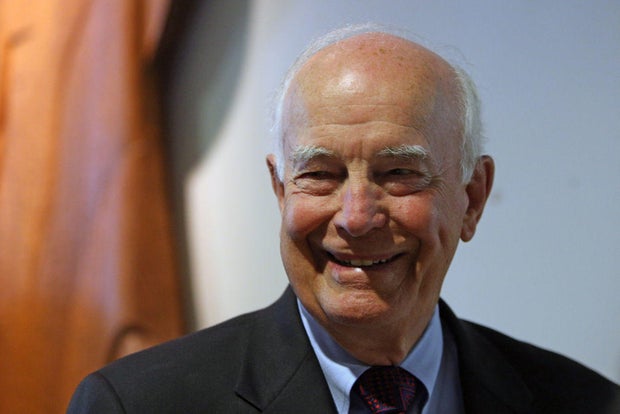Dan Evans, a popular three-term Republican governor of Washington state, has died. He left the Senate after serving there, frustrated that it was too rancorous and boring. He was 98.
Evans died Friday, according to the University of Washington, where he served as president and which has a school named after him, the Daniel J. Evans School of Public Policy and Governance.
“Dan Evans was an honorable, independent public servant who put Washington first and was committed to protecting and investing in the places and people of our state,” Democratic Sen. Patty Murray said in a statement Saturday. “We were fortunate to have him, and I am confident that his legacy will live on for generations to come.”
GENNA MARTIN/San Francisco Chronicle via Getty Images
Evans has been a dominant force in Washington politics for decades, and until current Gov. Jay Inslee, he was the only person to be elected governor three times. In a statement posted to social media, the Democrat said it was hard to think of another resident who had such a positive impact on so many aspects of the state.
“All of us, regardless of our political party, can feel fortunate for the progress he has made during his three terms as governor,” Inslee said.
Born in Seattle in 1925, Evans was a civil engineer before entering politics. He was elected to the state legislature in 1956 and won the governorship in 1964, defeating incumbent two-term Democrat Albert D. Rossellini in a tough year for his Republican colleagues. It was the year that President Lyndon Johnson trounced GOP candidate Barry Goldwater.
Known as a moderate-to-progressive Republican, this avid outdoorsman helped add new recreation and park areas to the state and supported clean air and water laws. He created the nation’s first state Department of Ecology, which President Richard Nixon used as a model for the Environmental Protection Agency.
Evans also failed to create a state income tax. He decided not to run for a fourth term.
“His legacy of coming together for the greater good, regardless of partisanship, has been and will continue to be an inspiration to public servants and the Evans School community,” school President Jody Sandfort said in a statement.
Sandport quoted Evans as saying, “It takes a bipartisan effort to accomplish good things, because often what we’re trying to accomplish is not partisan.”
After leaving the governor’s office in 1977, Evans remained in Olympia and served as president of Evergreen State College. Evans helped create the state’s schools by signing legislation authorizing liberal arts colleges, and as governor, he also supported the creation of a state community college system.
He gained a national profile while leading the state and was a featured speaker at the 1968 Republican National Convention. He was considered as a possible running mate for President Gerald Ford in 1976. Not a fan of Ronald Reagan, Evans supported Ford in 1976 and George H.W. Bush in 1980.
Evans, a popular Republican in a Democratic-leaning state, seemed like a no-brainer if he decided to run for Senate. He frequently dismissed such talk, saying in 1972, “I don’t like Washington, D.C. very much… and I can’t stand being in the Senate.”
But in 1983, Democratic Senator Henry “Scoop” Jackson died while in office, and Evans accepted the nomination to finish his term. Evans decided not to run in 1988, saying he was “bored with making decisions.” He said at the time that he was looking forward to returning home to enjoy the outdoors.
In later years, Evans served as president of his alma mater, the University of Washington. He also served on numerous nonprofit and corporate boards.
“Dad lived an exceptionally fulfilling life,” his sons Dan Jr., Mark and Bruce Evans said in a statement quoted in The Seattle Times. “Whether it was serving in public service, working to improve higher education, or mentoring aspiring public servants… he continued to sign up for something, right up until the very end. He impacted the lives of so many. And he did it without sacrificing his family.”
Evans’ wife, Nancy Belle Evans, died in January at age 90.

